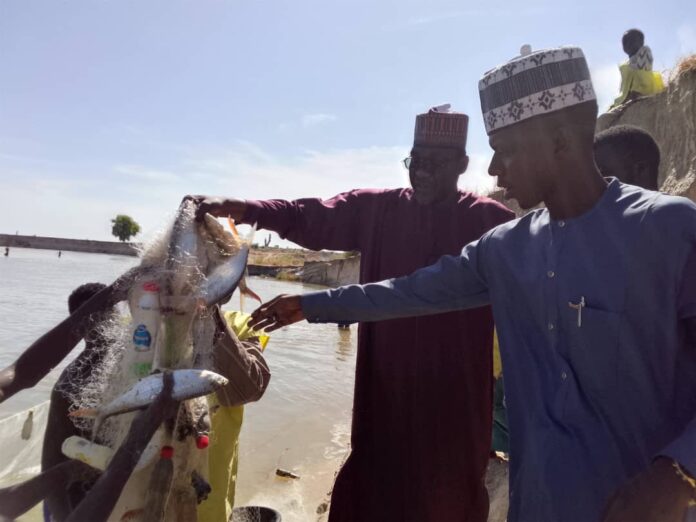By:Prof Tar
Borno State’s vision of rebuilding lives through sustainable livelihoods is taking firm root in the northernmost part of the state, where irrigation farming and fishing are not only restoring hope but also driving a quiet economic transformation. According to Professor Tar, an agricultural development expert, “Irrigation farming and fishing are blossoming, thanks to the vision of Governor Babagana Umara Zulum.”
The statement captures the essence of a new chapter unfolding in the once conflict-ravaged Abadam Local Government Area, particularly in Mallam Fatori, where the Borno State Government’s resettlement policy has successfully transitioned from dependency on humanitarian aid to a model of productivity and self-reliance.
For years, the devastating Boko Haram insurgency forced thousands of residents from their homes, dismantling livelihoods and cutting off economic activities. However, through a deliberate and inclusive policy approach, the Zulum administration has laid down a “sustainable solution framework” that supports the safe and dignified return of Internally Displaced Persons (IDPs) and refugees, while ensuring their access to viable means of livelihood.
Central to this policy is the elimination of dependency on government palliatives through the promotion of job creation and self-employment initiatives. The government’s philosophy is anchored on the belief that empowering people to produce what they consume — and even export — is the only sustainable path to lasting peace and stability.
In Mallam Fatori, that philosophy is alive and thriving. Once deserted and desolate, the community now bustles with renewed activity. Vast stretches of farmland have been revived under irrigation schemes that make year-round cultivation possible. The residents are now cultivating crops such as pepper, onion, garlic, pumpkin, cucumber, and okro on a commercial scale, contributing both to household food security and the local economy.
These agricultural initiatives are not just survival mechanisms — they represent a strategic component of Borno’s post-insurgency economic recovery. Farmers are not only feeding their families but are also supplying produce to domestic and regional export markets, underscoring the state’s growing role in regional food supply chains.
Beyond farming, fishing has re-emerged as a lifeline for many families. Along the River Yobe and the banks of Lake Chad, particularly around the Mallam Kaunari and Mamuri fishing grounds, located about three kilometers from Mallam Fatori, fishing activities are flourishing once again. These waters, which were once abandoned due to insecurity, now hum with life as fishermen haul in daily catches that sustain households and power small-scale trading.
The resurgence of fishing has also spurred new economic linkages, with women engaging in fish drying, processing, and marketing — a development that is creating inclusive growth and improving livelihoods, especially among widows and returnee families.
Speaking on the development, Prof. Tar noted that the integration of agricultural and fishing livelihoods reflects Governor Zulum’s strategic approach to resettlement — one that prioritizes economic resilience over dependency. “The idea is not just to return people to their ancestral homes, but to return them to a better and more sustainable way of life,” he said.
To consolidate these gains, the Borno State Government, through its Ministry of Agriculture and Natural Resources in collaboration with the Ministry of Information and Internal Security, has begun working on plans to secure the deeper portions of Lake Chad for large-scale fishing operations.
The initiative aims to boost household incomes, enhance food production, and establish Borno as a regional hub for fish export and aquaculture development. Once operational, the project is expected to attract private investment, create jobs, and expand the scope of the local economy, which is gradually rebounding after years of stagnation.
Security remains a crucial factor in sustaining this progress. The government has deployed a mix of civilian joint task forces, agro-rangers, and local vigilante groups to maintain stability around farmlands and fishing zones. Their efforts, supported by the Nigerian military, have enabled displaced persons to return safely and resume economic activities without fear.
The Borno resettlement policy stands out as one of the most comprehensive post-conflict recovery frameworks in Nigeria. Unlike traditional humanitarian interventions that rely on temporary relief materials, the Zulum administration has redefined the process by embedding livelihood restoration at the core of resettlement.
Under this model, displaced communities are not just resettled — they are empowered. The government provides seeds, farming tools, irrigation facilities, and access to markets, while also rehabilitating access roads and social amenities such as schools and healthcare centers.
Residents of Mallam Fatori have described the initiative as transformative. For many of them, the return to farming and fishing marks the first time in years that they can provide for their families without relying on aid.
The broader goal, according to officials from the Ministry of Information and Internal Security, is to restore human dignity and rebuild social confidence through self-sustaining livelihoods. The ministry’s Directorate of Information emphasized that economic revival in places like Mallam Fatori represents the success of the government’s long-term vision of recovery and stability.
“Governor Zulum’s resettlement vision is not just about reconstruction of buildings, but the reconstruction of lives,” the statement noted. “By empowering people to work, earn, and live in dignity, the government is securing peace from the roots.”
As irrigation pumps hum across farmlands and boats glide through the calm waters of the Lake Chad basin, the transformation in Abadam LGA tells a powerful story — that of resilience, leadership, and vision.
In the words of Prof. Tar: “What we are witnessing in Borno today is not just recovery — it is renewal. Irrigation farming and fishing are blossoming, thanks to the vision of Governor Zulum.”
— Directorate of Information, Ministry of Information and Internal Security, Borno State




